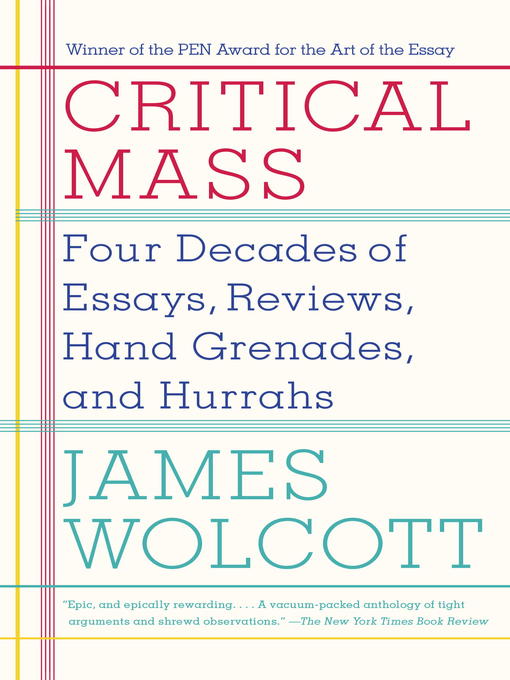
Critical Mass
Four Decades of Essays, Reviews, Hand Grenades, and Hurrahs
کتاب های مرتبط
- اطلاعات
- نقد و بررسی
- دیدگاه کاربران
نقد و بررسی

August 19, 2013
In essays previously published in the 1990s and 2000s, Vanity Fair culture critic Wolcott (Lucking Out) fires off acerbic surveys of cultural fads and preoccupations, taking a special interest in punk rock, film noir, comedy, and the literary canon of “Great White Males.” The aesthetic that binds the volume is what the author succinctly calls “the writing I’m proudest of, happiest with, the pieces that carry a lift.” Of the school of “hard-throwing” criticism, distinct from “snack-dip entertainment” reporting and the nut-gathering of “squirrel-scholars,” Wolcott wields the same powers he admires in his subjects: “intelligence, wit, style, and a prodigious range of reading,” with an “eye for the succinct, telling detail.” Wolcott, quoting novelist Kingsley Amis, says, “Importance isn’t important. Only good writing is.” Wolcott’s prose is agile, alert, kinetic; the sentences swing and hustle, cratered with barbed metaphor. Wolcott has few idols and no saints; he deplores shoddy technique, gooey sentiment, platitudes and punditry, and takes the occasional goofy jab at himself. Forthright and fair-minded, but ferocious in disdain, with the sly, smart voice of someone in the know but never caught up in the moment, this collection might be “an uncoated pill,” but it preserves an unforgettable specimen of “that New York specialty—the well-informed wise guy.” Agent: Elyse Cheney, Elyse Cheney Literary Associates.

August 15, 2013
A veteran culture critic for Vanity Fair and other publications weighs in and waxes wise on TV, comedians, music, movies, books and writers. Wolcott, who has written a memoir (Lucking Out, 2011, etc.), a novel and a collection of political commentaries, is an unusually erudite critic who writes with considerable humor, compassion and empathy--though his toolkit includes a deadly straight razor, as well. After a brief introduction, he launches into the collection, which is almost entirely chronological within each section (there are a few exceptions). He begins with that classic TV flare-up between William F. Buckley Jr. and Gore Vidal in 1968, an event which he revisits more than 400 pages later in a lacerating review of Fred Kaplan's biography of Vidal. One of Wolcott's great strengths is his visual sense and his metaphorical power; something impressive appears on nearly every page. Johnny Carson was "the comedic virtuoso of the superego"; Parker Posy, "scarily thin...plunges blade-like into every scene"; Sam Peckinpah "seemed to have a hand grenade for a heart"; Joyce Carol Oates' A Bloodsmoor Romance is "a speck of inspiration that somehow metamorphosed into a word-goop with a ravenous case of the eaties"; Truman Capote was "a debauched angel." Hungry readers will gobble these phrases like Halloween candy. Throughout the collection, Wolcott reveals his admiration for the work of Norman Mailer; his ambivalence about Vidal; his disdain for Oates and Richard Ford; and his respect for Philip Larkin and James Garner. He deals frankly with the private lives of writers--the laundry of Mailer and Styron dangles in the open air--and there is a series of essays about the Amises, father and son, which reveals all their darks, lights and grays. An eclectic collection that reasserts the author's reputation as one of America's most perceptive, candid and humane critics.
COPYRIGHT(2013) Kirkus Reviews, ALL RIGHTS RESERVED.

October 15, 2013
Critic Wolcott follows his rapier memoir, Lucking Out (2011), with a mammoth retrospective essay and review collection. A writer of mettle and skill zestfully committed to critical journalism, Wolcott pairs probing opinion with vigorous yet concrete language and pushes so far beyond the bland that his reviews, even decades later, are fiery and daring. At times prescient, as in his 1975 recognition of Patti Smith's mustang power, he is also neatly funny. Pauline Kael was his mentor, Dorothy Parker a precursor, Susan Sontag a goad, and Norman Mailer an inspiration. Wolcott's enthusiasm for get-it-right attacks and appreciation burns as brightly whether he's writing about television, comedy, music, movies, or books. Wolcott's subjects range from the seventies sit-com, Mary Hartman, Mary Hartman, to such current hits as Downton Abbey and Boardwalk Empire, Johnny Carson to David Letterman, Brian De Palma to Woody Allen, Ayn Rand to John Updike. He constructs each analysis and argument with shrewd, securely grounded observations and briskly establishes richly dimensional biographical, social, and aesthetic contexts. Wolcott's provoking and illuminating critiques both channel and fuel the cultural ferment.(Reprinted with permission of Booklist, copyright 2013, American Library Association.)

May 15, 2013
From his early work at the Village Voice on TV, and in film and rock and roll to his seminal literary criticism in the 1980s and 1990s and his current work as a culture critic and blogger for Vanity Fair, Wolcott is the critic's critic, defining the genre while setting a new, higher standard. Here's the best of the best.
Copyright 2013 Library Journal, LLC Used with permission.

























دیدگاه کاربران